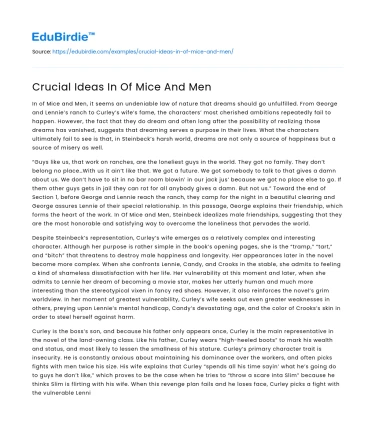In of Mice and Men, it seems an undeniable law of nature that dreams should go unfulfilled. From George and Lennie’s ranch to Curley’s wife’s fame, the characters’ most cherished ambitions repeatedly fail to happen. However, the fact that they do dream and often long after the possibility of realizing those dreams has vanished, suggests that dreaming serves a purpose in their lives. What the characters ultimately fail to see is that, in Steinbeck’s harsh world, dreams are not only a source of happiness but a source of misery as well.
“Guys like us, that work on ranches, are the loneliest guys in the world. They got no family. They don’t belong no place…With us it ain’t like that. We got a future. We got somebody to talk to that gives a damn about us. We don’t have to sit in no bar room blowin’ in our jack jus’ because we got no place else to go. If them other guys gets in jail they can rot for all anybody gives a damn. But not us.” Toward the end of Section 1, before George and Lennie reach the ranch, they camp for the night in a beautiful clearing and George assures Lennie of their special relationship. In this passage, George explains their friendship, which forms the heart of the work. In Of Mice and Men, Steinbeck idealizes male friendships, suggesting that they are the most honorable and satisfying way to overcome the loneliness that pervades the world.
Save your time!
We can take care of your essay
- Proper editing and formatting
- Free revision, title page, and bibliography
- Flexible prices and money-back guarantee
Despite Steinbeck’s representation, Curley’s wife emerges as a relatively complex and interesting character. Although her purpose is rather simple in the book’s opening pages, she is the “tramp,” “tart,” and “bitch” that threatens to destroy male happiness and longevity. Her appearances later in the novel become more complex. When she confronts Lennie, Candy, and Crooks in the stable, she admits to feeling a kind of shameless dissatisfaction with her life. Her vulnerability at this moment and later, when she admits to Lennie her dream of becoming a movie star, makes her utterly human and much more interesting than the stereotypical vixen in fancy red shoes. However, it also reinforces the novel’s grim worldview. In her moment of greatest vulnerability, Curley’s wife seeks out even greater weaknesses in others, preying upon Lennie’s mental handicap, Candy’s devastating age, and the color of Crooks’s skin in order to steel herself against harm.
Curley is the boss’s son, and because his father only appears once, Curley is the main representative in the novel of the land-owning class. Like his father, Curley wears “high-heeled boots” to mark his wealth and status, and most likely to lessen the smallness of his stature. Curley’s primary character trait is insecurity. He is constantly anxious about maintaining his dominance over the workers, and often picks fights with men twice his size. His wife explains that Curley “spends all his time sayin’ what he’s going do to guys he don’t like,” which proves to be the case when he tries to “throw a scare inta Slim” because he thinks Slim is flirting with his wife. When this revenge plan fails and he loses face, Curley picks a fight with the vulnerable Lennie to reaffirm his status. Curley’s insecurity suggests that the land-owning class is more vulnerable than one would be led to believe. The working class is stronger (represented by Lennie) and has more moral authority (represented in Slim), but landowners like Curley maintain their authority and control by creating conditions of fear and isolation for their workers.
The conclusions drawn from the introductions of the novel were written to encourage the American people that they could gain positive attitudes through bring good at a job like Slim, who is confident about himself, or like Lennie and George, who aren’t ‘mean’ because of friendship. Perhaps the reason that these ideas were in the introductions was to indicate that the end of the depression and a better life could be foreseen at its beginning.






 Stuck on your essay?
Stuck on your essay?

